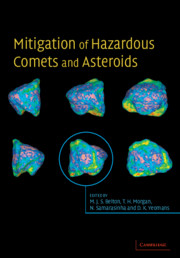Book contents
- Frontmatter
- Contents
- List of contributors
- Preface
- Acknowledgments
- Glossary
- 1 Recent progress in interpreting the nature of the near-Earth object population
- 2 Earth impactors: orbital characteristics and warning times
- 3 The role of radar in predicting and preventing asteroid and comet collisions with Earth
- 4 Interior structures for asteroids and cometary nuclei
- 5 What we know and don't know about surfaces of potentially hazardous small bodies
- 6 About deflecting asteroids and comets
- 7 Scientific requirements for understanding the near-Earth asteroid population
- 8 Physical properties of comets and asteroids inferred from fireball observations
- 9 Mitigation technologies and their requirements
- 10 Peering inside near-Earth objects with radio tomography
- 11 Seismological investigation of asteroid and comet interiors
- 12 Lander and penetrator science for near-Earth object mitigation studies
- 13 Optimal interception and deflection of Earth-approaching asteroids using low-thrust electric propulsion
- 14 Close proximity operations at small bodies: orbiting, hovering, and hopping
- 15 Mission operations in low-gravity regolith and dust
- 16 Impacts and the public: communicating the nature of the impact hazard
- 17 Towards a national program to remove the threat of hazardous NEOs
- Index
Preface
Published online by Cambridge University Press: 12 October 2009
- Frontmatter
- Contents
- List of contributors
- Preface
- Acknowledgments
- Glossary
- 1 Recent progress in interpreting the nature of the near-Earth object population
- 2 Earth impactors: orbital characteristics and warning times
- 3 The role of radar in predicting and preventing asteroid and comet collisions with Earth
- 4 Interior structures for asteroids and cometary nuclei
- 5 What we know and don't know about surfaces of potentially hazardous small bodies
- 6 About deflecting asteroids and comets
- 7 Scientific requirements for understanding the near-Earth asteroid population
- 8 Physical properties of comets and asteroids inferred from fireball observations
- 9 Mitigation technologies and their requirements
- 10 Peering inside near-Earth objects with radio tomography
- 11 Seismological investigation of asteroid and comet interiors
- 12 Lander and penetrator science for near-Earth object mitigation studies
- 13 Optimal interception and deflection of Earth-approaching asteroids using low-thrust electric propulsion
- 14 Close proximity operations at small bodies: orbiting, hovering, and hopping
- 15 Mission operations in low-gravity regolith and dust
- 16 Impacts and the public: communicating the nature of the impact hazard
- 17 Towards a national program to remove the threat of hazardous NEOs
- Index
Summary
The chapters in this book are based on a series of invited lectures given at the “Workshop on Scientific Requirements for Mitigation of Hazardous Comets and Asteroids,” which was held in Arlington, Virginia, on September 3–6, 2002. The focus of the workshop was to determine what needs to be done to ensure that an adequate base of scientific knowledge can be created that will allow efficient development of a reliable, but as yet undefined, collision mitigation system when it is needed in the future.
To achieve this goal essentially all aspects of near-Earth objects were discussed at the workshop, including the completeness of our knowledge about the population of potential impactors, their physical and compositional characteristics, the properties of surveys that need to be done to find hazardous objects smaller than 1 km in size, our theoretical understanding of impact phenomena, new laboratory results on the impact process, the need for space missions of specific types, education of the public, public responsibility for dealing with the threat, and the possible roles in the United States of the National Aeronautics and Space Administration (NASA), the military, and other government agencies in mitigating the threat.
Most of these topics are, we believe, well covered by the material contained within this volume and so it should serve both as a snapshot of the state of the collision hazard issue in the United States in late 2002 and also a useful sourcebook for reference into the associated technical literature.
Information
- Type
- Chapter
- Information
- Mitigation of Hazardous Comets and Asteroids , pp. xi - xiiPublisher: Cambridge University PressPrint publication year: 2004
